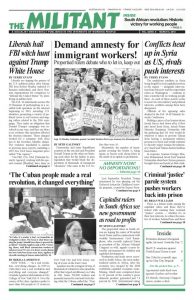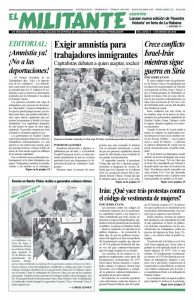Below is an excerpt from an interview with Malcolm X published in the March-April, 1965 issue of the Young Socialist, conducted Jan. 18 of that year by Jack Barnes and Barry Sheppard of the Young Socialist Alliance. A month later, on Feb. 21, Malcolm was assassinated while speaking at the Audubon Ballroom in Harlem, New York. The interview appears in By Any Means Necessary, one of Pathfinder’s Books of the Month for February. Copyright © 1970, 1992 by Betty Shabazz and Pathfinder Press. Reprinted by permission.
QUESTION: Why did you break with the Black Muslims?
MALCOLM: I didn’t break, there was a split. The split came about primarily because they put me out, and they put me out because of my uncompromising approach to problems I thought should be solved and the movement could solve.
I felt the movement was dragging its feet in many areas. It didn’t involve itself in the civil or civic or political struggles our people were confronted by. All it did was stress the importance of moral reformation — don’t drink, don’t smoke, don’t permit fornication and adultery. When I found that the hierarchy itself wasn’t practicing what it preached, it was clear that this part of its program was bankrupt.
So the only way it could function and be meaningful in the community was to take part in the political and economic facets of the Negro struggle. And the organization wouldn’t do that because the stand it would have to take would have been too militant, uncompromising, and activist, and the hierarchy had gotten conservative. It was motivated mainly by protecting its own self interests. I might also point out that although the Black Muslim movement professed to be a religious group, the religion they had adopted — Islam — didn’t recognize them. So, religiously it was in a vacuum. And it didn’t take part in politics, so it was not a political group. When you have an organization that’s neither political nor religious and doesn’t take part in the civil rights struggle, what can it call itself? It’s in a vacuum. So, all of these factors led to my splitting from the organization. …
QUESTION: How do you define black nationalism, with which you have been identified?
MALCOLM: I used to define black nationalism as the idea that the black man should control the economy of his community, the politics of his community, and so forth.
But, when I was in Africa in May, in Ghana, I was speaking with the Algerian ambassador who is extremely militant and is a revolutionary in the true sense of the word (and has his credentials as such for having carried on a successful revolution against oppression in his country). When I told him that my political, social, and economic philosophy was black nationalism, he asked me very frankly, well, where did that leave him? Because he was white. He was an African, but he was Algerian, and to all appearances, he was a white man. And he said if I define my objective as the victory of black nationalism, where does that leave him? Where does that leave revolutionaries in Morocco, Egypt, Iraq, Mauritania? So he showed me where I was alienating people who were true revolutionaries dedicated to overturning the system of exploitation that exists on this earth by any means necessary.
So, I had to do a lot of thinking and reappraising of my definition of black nationalism. Can we sum up the solution to the problems confronting our people as black nationalism? And if you notice, I haven’t been using the expression for several months. But I still would be hard pressed to give a specific definition of the overall philosophy which I think is necessary for the liberation of the black people in this country. …
QUESTION: How do you view the role of the U.S. in the Congo?
MALCOLM: As criminal. Probably there is no better example of criminal activity against an oppressed people than the role the U.S. has been playing in the Congo, through her ties with Tshombe and the mercenaries. You can’t overlook the fact that Tshombe gets his money from the U.S. The money he uses to hire these mercenaries — these paid killers imported from South Africa — comes from the United States. The pilots that fly these planes have been trained by the U.S. The bombs themselves that are blowing apart the bodies of women and children come from the U.S. So I can only view the role of the United States in the Congo as a criminal role. And I think the seeds she is sowing in the Congo she will have to harvest. The chickens that she has turned loose over there have got to come home to roost.
QUESTION: What about the U.S. role in South Vietnam?
MALCOLM: The same thing. It shows the real ignorance of those who control the American power structure. If France, with all types of heavy arms, as deeply entrenched as she was in what then was called Indochina, couldn’t stay there, I don’t see how anybody in their right mind can think the U.S. can get in there — it’s impossible. So it shows her ignorance, her blindness, her lack of foresight and hindsight and her complete defeat in South Vietnam is only a matter of time. …
QUESTION: What is your opinion of the worldwide struggle now going on between capitalism and socialism?
MALCOLM: It is impossible for capitalism to survive, primarily because the system of capitalism needs some blood to suck. Capitalism used to be like an eagle, but now it’s more like a vulture. It used to be strong enough to go and suck anybody’s blood whether they were strong or not. But now it has become more cowardly, like the vulture, and it can only suck the blood of the helpless. As the nations of the world free themselves, then capitalism has less victims, less to suck, and it becomes weaker and weaker. It’s only a matter of time in my opinion before it will collapse completely.

